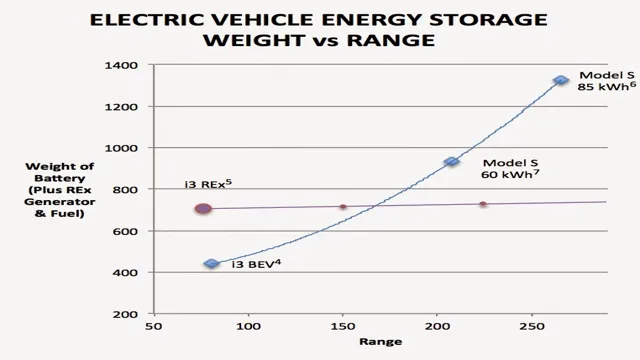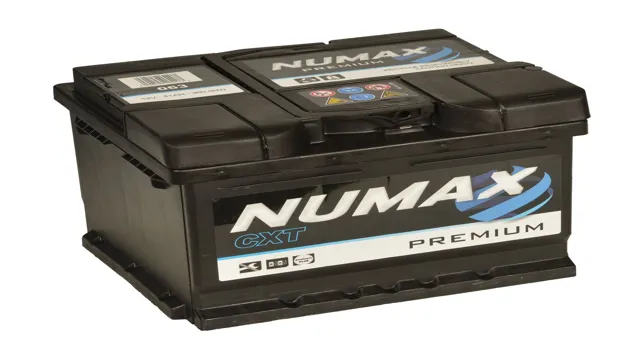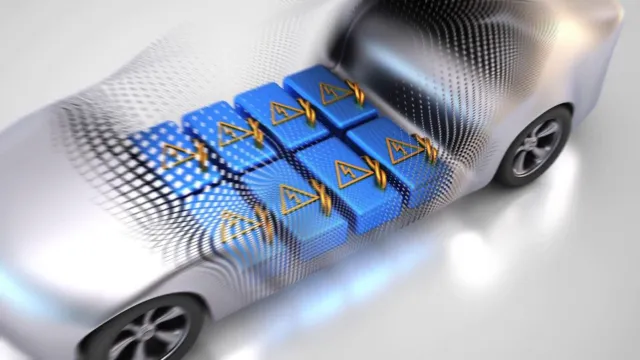Unlocking the Mystery of Electric Car Battery Weight in Pounds: How Much Weight You’re Carrying & What It Means for Your Driving Experience
Electric cars are taking the world by storm, providing an eco-friendly and cost-effective way to travel. However, one of the most significant concerns when it comes to electric vehicles is the weight of their batteries. The heavier the battery, the more energy it takes to move the car, reducing the car’s overall efficiency.
In this article, we will explore the world of electric car battery weight, providing the ultimate guide for anyone looking to understand this important aspect of electric vehicles. From the reasons for battery weight differences to how they affect the car’s performance, we’ve got you covered. Let’s dive into the world of electric car batteries and learn what makes them so pivotal in powering the vehicles of the future.
Understanding Electric Car Battery Weight
When it comes to electric cars, one of the main concerns for potential buyers is the weight of the battery. Electric car battery weight in lbs can range from around 500 to more than 1,000 lbs depending on the size and capabilities of the vehicle. This weight can impact the car’s overall performance as it affects acceleration, range, and handling.
However, it’s important to note that electric car manufacturers are constantly working on improving battery technology to make them lighter and more efficient. Moreover, the weight of the battery is offset by its many advantages, such as lower emissions, lower fuel costs, and reduced reliance on fossil fuels. When deciding whether to purchase an electric car, it’s crucial for buyers to consider the battery weight, but also to take into account the many benefits they offer.
What Is Battery Weight?
Electric car battery weight is a critical factor in determining the overall weight and performance of an electric vehicle. The battery pack is the heaviest component of an electric car, which is why lighter and more efficient battery technologies are in high demand. Lithium-ion batteries are the most commonly used type of electric car battery, but there are other alternatives currently being researched, such as solid-state batteries, that aim to provide more extended driving ranges at a lighter weight.
Additionally, the weight distribution of the battery pack also plays a role in the vehicle’s handling and stability. Manufacturers are constantly optimizing their battery designs to achieve the ideal balance of weight, range, and power for electric cars. In conclusion, electric car battery weight is a critical factor that influences the performance, range, and handling of electric vehicles.
Factors Influencing Battery Weight
Electric car batteries are a crucial component of electric vehicles. However, the weight of the electric car batteries could be a significant concern for vehicle manufacturers and car owners. Several factors influence the weight of an electric car battery.
Firstly, the size of the battery has a direct impact on its weight. Larger batteries tend to weigh more than smaller ones. Secondly, the battery technology and material used also play a crucial role in battery weight.
Lithium-ion batteries are the most common type of battery used in electric vehicles, and they are relatively heavy compared to other battery technologies. Lastly, the range of the battery also affects its weight. Batteries with higher ranges tend to be heavier than those with lower ranges.
In summary, understanding the factors influencing battery weight helps to minimize the weight of electric car batteries, which can improve vehicle performance and reduce fuel consumption.
Comparison of Electric Car Battery Weights
When it comes to electric car battery weight, it can vary between models. For example, the Tesla Model S has a battery pack that weighs around 1,200 lbs. Meanwhile, the Nissan Leaf’s battery pack only weighs around 400 lbs.
This is due to differences in the size, capacity, and chemistry of the batteries used. The weight of an electric car’s battery pack is a crucial factor to consider as it affects the car’s overall performance and range. Additionally, it can impact the vehicle’s center of gravity, affecting its handling and stability.
Understanding the weight of an electric car battery is essential when comparing different models and determining which one will work best for your needs.
Top 5 Electric Car Batteries and Their Weights (in lbs)
Electric car batteries, battery weights Electric cars have become increasingly popular due to their eco-friendliness and rising fuel prices. One crucial aspect of electric cars is their batteries, which are responsible for storing and supplying energy to the motor. The weight of the battery is a crucial factor that affects the car’s performance, range, and overall efficiency.
In this article, we’ll be comparing the top 5 electric car batteries and their weights (in lbs). The first on our list is the Tesla Model S battery, which weighs 1,060 lbs. Second is the Chevy Bolt battery at 960lbs, followed by the Nissan Leaf with its battery weighing 630lbs.
Next up is the BMW i3 battery, which weighs 500lbs. Lastly, we have the Ford Focus Electric battery, which weighs 635lbs. These weights are relative to the battery size and power output, with Tesla and Chevy batteries being the heaviest due to their larger capacities and longer ranges.
On the other hand, the BMW i3 battery is relatively lighter as it has a shorter range and a smaller battery capacity. It’s crucial to consider the battery weight when purchasing an electric car as it significantly affects the car’s performance and range. Therefore, it’s essential to strike a balance between battery capacity, weight, and range to make the most of your electric car’s capabilities.
How Does An Electric Car Battery Compare to a Gasoline Engine?
When it comes to the weight of an electric car battery compared to a gasoline engine, it’s no secret that there is a major difference. Electric car batteries tend to be heavier than gasoline engines due to the technology used to power the vehicle. While a typical gasoline engine weighs around 400-700 pounds, an electric car battery can range from 500-1200 pounds, depending on the make and model of the vehicle.
However, it’s important to note that the additional weight of the battery is offset by the fact that electric cars have fewer moving parts than traditional gas-powered cars. This means that electric cars are typically more efficient and require less maintenance over time. Additionally, as technology continues to advance, electric car batteries are becoming lighter and more powerful, making them an increasingly appealing option for environmentally-conscious drivers.
The Impact of Battery Weight on Electric Car Performance
When it comes to electric cars, one important factor that affects its performance is the weight of the battery. The heavier the battery, the more energy it takes to move the car, which can lead to a shorter driving range and slower acceleration. It’s important for electric car manufacturers to strike a balance between battery weight and performance.
Let’s compare the battery weights of some popular electric cars. The Tesla Model S has a 100 kWh battery pack that weighs about 1,200 pounds. The Nissan Leaf has a 40 kWh battery pack that weighs around 600 pounds.
The Chevrolet Bolt has a 60 kWh battery pack that weighs approximately 960 pounds. As you can see, there is a significant difference in the weight of these batteries, which can impact their overall performance. When choosing an electric car, it’s important to consider the weight of the battery and how it can affect factors like driving range and acceleration.
Ways to Reduce Electric Car Battery Weight
Reducing the weight of electric car batteries is a hot topic in the automobile industry. Manufacturers are constantly seeking ways to enhance the performance and range of electric vehicles by cutting down on the battery weight. One way to achieve this is by shifting to lightweight materials, such as aluminum or carbon fiber, rather than traditional heavy metals like lead.
This not only reduces weight but also strengthens the battery structure. Another method is to optimize the battery design and configuration. By rearranging the cells and integrating them tightly, the battery can become more compact and lighter.
Additionally, advanced technologies like solid-state batteries that use ceramic electrolytes, instead of liquid, can shave off considerable weight and offer better energy density. Though battery weight is essential for performance, these strategies can make electric vehicles more efficient and eco-friendly. So next time you are out looking for a new electric car, keep an eye out for these features for a smoother, lighter ride!
The Role of Battery Materials
The role of battery materials in electric cars is pivotal in determining their performance. One of the major challenges electric cars face is their battery weight. Heavy batteries can affect the vehicle’s range, acceleration, and overall efficiency.
That’s where reducing the battery weight becomes crucial. There are various ways to achieve this, such as using lightweight materials like aluminum and magnesium in battery casings and enclosures, using high-energy-density cathode materials, and using solid-state batteries instead of traditional lithium-ion batteries. These measures can reduce the overall weight of electric car batteries while providing better performance and longer ranges.
Nonetheless, it is essential to strike a balance between reducing weight and maintaining safety standards to ensure that electric cars are both efficient and safe on the roads. By implementing these methods, we can improve the performance of electric cars while making them more accessible and sustainable for future generations.
Lighter Electric Car Designs
One way to make electric cars more efficient is to reduce the weight of the battery. Engineers are constantly looking for ways to design batteries that have a lower weight-to-power ratio. A popular method is to use lithium-ion batteries that are lighter and more durable than traditional nickel-cadmium batteries.
Another approach is to use materials that are lighter but still strong enough to protect the battery, such as aluminum or carbon fiber. Car manufacturers also look at other parts of the car, like the frame or suspension, to see where weight can be reduced without sacrificing safety or performance. Ultimately, lighter electric cars will have longer ranges, require less frequent charging, and be more affordable for consumers.
By reducing the battery weight, engineers can design cars that are sleek, attractive, and functional while still being environmentally responsible.
Conclusion: Electric Car Battery Weight in a Nutshell
In conclusion, the weight of electric car batteries is a heavy topic to tackle (pun intended). The pressure to decrease their weight while maintaining efficiency is a challenge faced by many manufacturers. But let’s not forget, the weight of the battery is a small price to pay for the environmental benefits of driving an electric car.
So, while we may be carrying around a few extra pounds in our vehicles, we can take comfort in knowing we’re doing our part to lighten the load on the planet.”
FAQs
What is the average weight of an electric car battery in lbs?
The average weight of an electric car battery is around 500 lbs.
How much does the weight of an electric car battery affect its performance?
The weight of an electric car battery can affect its performance as it adds to the overall weight of the vehicle, which can affect its acceleration and energy efficiency.
Can the weight of an electric car battery be reduced?
Yes, the weight of an electric car battery can be reduced through advancements in battery technology and materials, such as the use of lithium-ion batteries.
How does the weight of an electric car battery compare to a traditional gasoline car’s engine?
The weight of an electric car battery is typically heavier than a traditional gasoline car’s engine, but it is distributed differently throughout the vehicle.






